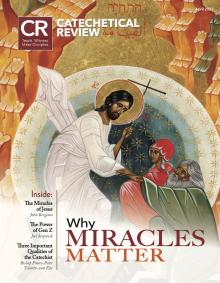Where should a modern-day catechist turn for practical advice? While there are abundant resources in our day and age, I was surprised to find some of the most relatable help I’ve ever read in a fifth-century document written by an early Church Father.
St. Augustine wrote The First Catechetical Instruction in response to a request for advice on how to pass on the faith to others.[1] Augustine was a convert, catechist, and bishop who was born in the fourth century. Even though Augustine wasn’t baptized until later in life, he’s known as a Doctor of the Church and the Father of Catechesis.
Unlike the Church Fathers before him, Augustine was dealing with hordes of people who wanted to be baptized—but for all the wrong reasons (politics, social status, you name it). I was touched by how loving Augustine’s words for catechists were in facing these challenging situations. Instead of scholarly and dry, I found Augustine’s writing warmly empathetic to people who are “in the trenches” of catechesis in today’s world. Here are some insights that stood out to me as I read.
God loves a cheerful catechist. Augustine has great empathy for the catechist. He recognizes the tendency to grow weary, the desire “to have something better for your hearers,” and the frequent dissatisfaction with your own catechesis after the fact (FCI 3). Still, he maintains that “our chief concern is what means we should adopt to ensure that the catechizer enjoys his work . . . For if in the case of material wealth God loves a cheerful giver, how much more in that of spiritual?” (4). What a beautiful priority, and one I don’t often see with those who are recruiting catechists (especially when we’re desperate—often any warm body will do!). What a difference it makes when catechesis begins in joy.
The reason people come for catechesis isn’t always the reason they stay. Augustine speaks a great deal of a person who is being catechized wishing “to become in reality what he had decided to feign” (9). In other words, a person may begin their inquiry into faith with a superficial or selfish reason, but during their journey Jesus can transform that “feigned” reason into true devotion. It reminds me of an important principle I’ve learned: “The reason you come isn’t always the reason you stay.” I’ve seen this especially in the RCIA. We should never look down on a person’s seemingly shallow motives (getting married to a Catholic, wanting a sacrament because it’s important to Grandma), since those motives are often purified in their inquiry process.
The rest of this online article is available for current Guild members.
This article is from The Catechetical Review (Online Edition ISSN 2379-6324) and may be copied for catechetical purposes only. It may not be reprinted in another published work without the permission of The Catechetical Review by contacting [email protected]

















